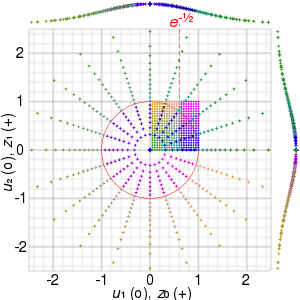Random Number sampling method
Box-Muller Transform
Given a source of uniformly distributed random numbers, the Box-Muller Transform generates normally distributed random numbers.
Math
Suppose and are independent samples chosen from the uniform distribution on the unit interval (0, 1).
Then and are independent random variables with a standard normal distribution.

#include <cmath>
#include <limits>
#include <random>
#include <utility>
std::pair<double, double> generateGaussianNoise(double mu, double sigma)
{
constexpr double epsilon = std::numeric_limits<double>::epsilon();
constexpr double two_pi = 2.0 * M_PI;
//initialize the random uniform number generator (runif) in a range 0 to 1
static std::mt19937 rng(std::random_device{}()); // Standard mersenne_twister_engine seeded with rd()
static std::uniform_real_distribution<> runif(0.0, 1.0);
//create two random numbers, make sure u1 is greater than epsilon
double u1, u2;
do
{
u1 = runif(rng);
}
while (u1 <= epsilon);
u2 = runif(rng);
//compute z0 and z1
auto mag = sigma * sqrt(-2.0 * log(u1));
auto z0 = mag * cos(two_pi * u2) + mu;
auto z1 = mag * sin(two_pi * u2) + mu;
return std::make_pair(z0, z1);
}